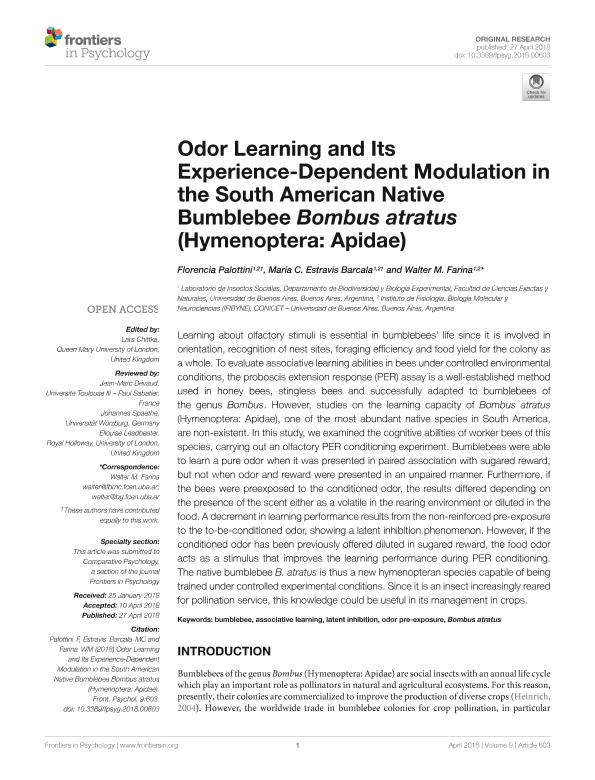Artículo
Odor Learning and Its Experience-Dependent Modulation in the South American Native Bumblebee Bombus atratus (Hymenoptera: Apidae)
Fecha de publicación:
04/2018
Editorial:
Frontiers Media SA
Revista:
Frontiers in Psychology
ISSN:
1664-1078
Idioma:
Inglés
Tipo de recurso:
Artículo publicado
Clasificación temática:
Resumen
Learning about olfactory stimuli is essential in bumblebees' life since it is involved in orientation, recognition of nest sites, foraging efficiency and food yield for the colony as a whole. To evaluate associative learning abilities in bees under controlled environmental conditions, the proboscis extension response (PER) assay is a well-established method used in honey bees, stingless bees and successfully adapted to bumblebees of the genus Bombus. However, studies on the learning capacity of Bombus atratus (Hymenoptera: Apidae), one of the most abundant native species in South America, are non-existent. In this study, we examined the cognitive abilities of worker bees of this species, carrying out an olfactory PER conditioning experiment. Bumblebees were able to learn a pure odor when it was presented in paired association with sugared reward, but not when odor and reward were presented in an unpaired manner. Furthermore, if the bees were preexposed to the conditioned odor, the results differed depending on the presence of the scent either as a volatile in the rearing environment or diluted in the food. A decrement in learning performance results from the non-reinforced pre-exposure to the to-be-conditioned odor, showing a latent inhibition phenomenon. However, if the conditioned odor has been previously offered diluted in sugared reward, the food odor acts as a stimulus that improves the learning performance during PER conditioning. The native bumblebee B. atratus is thus a new hymenopteran species capable of being trained under controlled experimental conditions. Since it is an insect increasingly reared for pollination service, this knowledge could be useful in its management in crops.
Archivos asociados
Licencia
Identificadores
Colecciones
Articulos(OCA CIUDAD UNIVERSITARIA)
Articulos de OFICINA DE COORDINACION ADMINISTRATIVA CIUDAD UNIVERSITARIA
Articulos de OFICINA DE COORDINACION ADMINISTRATIVA CIUDAD UNIVERSITARIA
Citación
Palottini, Florencia; Estravis Barcala, Maria Cecilia; Farina, Walter Marcelo; Odor Learning and Its Experience-Dependent Modulation in the South American Native Bumblebee Bombus atratus (Hymenoptera: Apidae); Frontiers Media SA; Frontiers in Psychology; 9; 4-2018; 1-10
Compartir
Altmétricas




